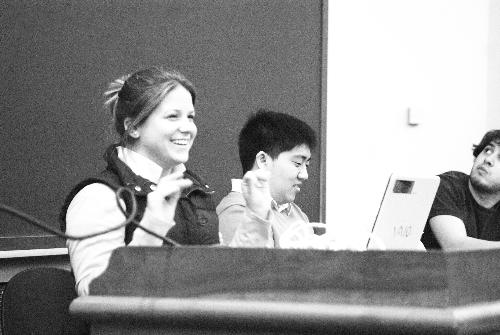
The Outsider’s Insider
Undergraduate Council Vice President Annie R. Riley ’07 rarely speaks, except to turn aside and express her frustration to John S. Haddock ’07. He slams his gavel. Despite the UC president’s greatest efforts, law and order have momentarily ceased. The representatives have banded into nomadic conglomerates, wandering the room. “That’s a fallacy of logic,” one young erudite exclaims from the margins of the room. “Your logic would have integrity if…” another student trails off in response. The sponsor of the contentious bill motions to have an “out of order” opponent immediately expelled. The motion fails, the gavel comes down, and Annie Riley shakes her head.
By being quiet, Riley has made the UC loud. Armed with a keen ear for students’ concerns, she leads by listening. Although the diverse and divisive debates she fosters at times land in the world of minutia, her approach has spawned results. Halfway into her tenure, Riley has already spearheaded the institution of a new social programming board and proposed a popular overhaul of the Campus Life Committee (CLC). Although Riley is not exactly a trailblazer—last year’s president and vice president already proposed such an agenda—Riley’s style is avant-garde. Riley has meticulously checked off a list of student groups to meet with, lassoing them into the UC legislative process. By integrating a strong base of student support, Riley has been able to succeed where her predecessors failed.
Democracy Lane
Riley grew up on Democracy Lane in Potomac, Maryland, and the road’s appellation predicted her life’s route. Riley believes that Democracy lane “instilled” in her the value of tearing down barriers to “outsiders,” such as people outside the UC.
In 2005, Riley resigned from her position as representative. Riley was disgusted with the “Ivory Tower” image of the council. “Sometimes the UC becomes a little too insular,” Riley says, “and it doesn’t reach out appropriately to student groups and students who sometimes know the issues better than the representatives themselves. It really bugged me.” Riley felt that in her position as one of many representatives, it would be impossible for her to make the UC more inclusive.
That fall, Riley hobnobbed with the students the UC was supposed to represent. She rose to the presidency of Best Buddies, which aids the mentally retarded, and joined CityStep.
Aiming to put the undergraduate back in the undergraduate council, she teamed up with John Haddock to run an anti-establishment ticket. With the campaign home site of fixtheuc.com, the duo promoted tearing down the Ivory Tower image of the council and reforming the CLC. Citing the failed Wyclef concert and the dismal Springfest, Haddock and Riley proposed that campus entertainment be handled by an independent student organization. “Typically people that want to do programming generally don’t run for the UC,” Riley says. Because of the current election process, members of the CLC tend to be more concerned with campus legislation than social life.
To fix this, Riley sponsored a bill that passed earlier this month to create an independent social programming board. Beginning next semester, the College will endow the board with a $200,000 financial allocation, a four-fold increase over the UC’s typical events budget. According to an article in The Crimson, the new board will be responsible for planning five different social events: two outdoors events like Yardfest, a concert, and Harvard-Yale. The board’s creation effectively outsources the social-planning role traditionally held by the CLC. According to Matthew R. Greenfield ’08, the UC is mulling over three potential plans, all of which involve the dissolution of the enfeebled committee.
Democracy at Work
Riley’s inclusive approach to leadership has distinguished her from her predecessors. As Greenfield recalls, Clay T. Capp ’06 unveiled his plan for CLC reform well past the witching hour on the night before the vote, allowing little time for the proposal to be tweaked and refined. Nor did Capp initially brainstorm with College administrators and student groups, such as H-Club, which organizes tailgates, including Harvard-Yale. As H-Club Vice President Whitney S.F. Baxter ’07 notes, “I wasn’t really involved in what Glazer/Capp did.” The alienation of the everyday Harvardite from the goings-on within the walls of the UC bred apathy within the student body, ensuring the eventual failure of Capp’s hastily hashed proposal. Crimson Key President Nicole T. Townsend ’07 says, “The CLC never really reached out to us.”
On the other hand, Riley has used social intercourse to conceive the new programming board. From the very beginning of her term, she has organized meetings with large social organizations, such as H-Club and Crimson Key Society, to tease out ideas for CLC reform. “Your comments are never taken for granted with Annie,” Baxter says. “She really does care about other people’s ideas.”
Riley’s approach of sitting back and absorbing students’ ideas could, at times, allow disorder to grow at meetings. Baxter says that “we would debate minutia.” But overall, Baxter believes that the occasional sidetrack is a small price to pay for the open atmosphere harbored at these discussions.
Back at the UC meeting, the anarchy in the room increases. UC representatives have begun hunting and gathering support from neighboring groups. “Sit down!” Riley exclaims from the dais. “Sit down,” she sternly repeats as the raucous members mill about the meeting. The representatives follow her orders. Sometimes even Riley can’t be all ears. Sometimes even she has to lay down the law.


